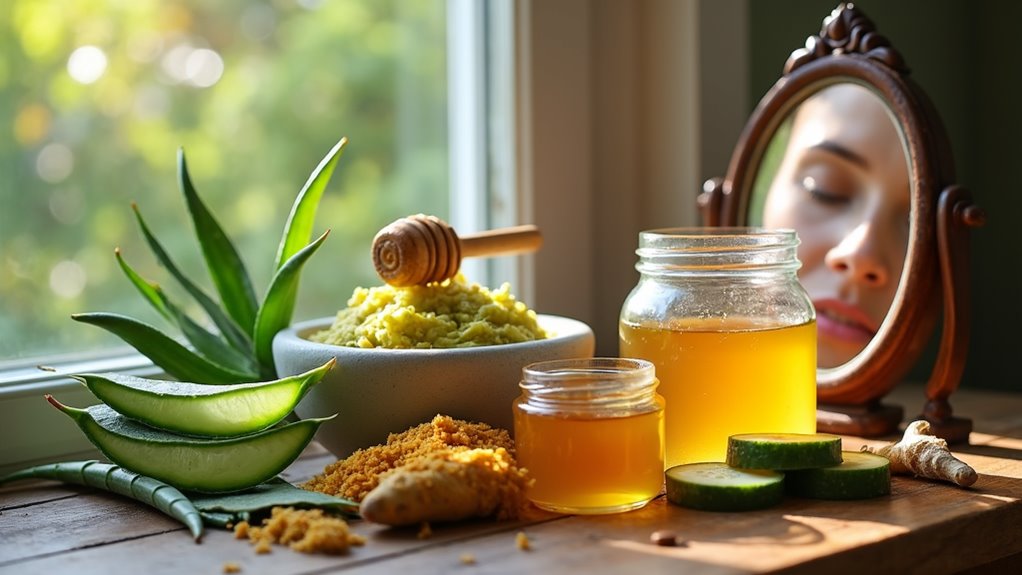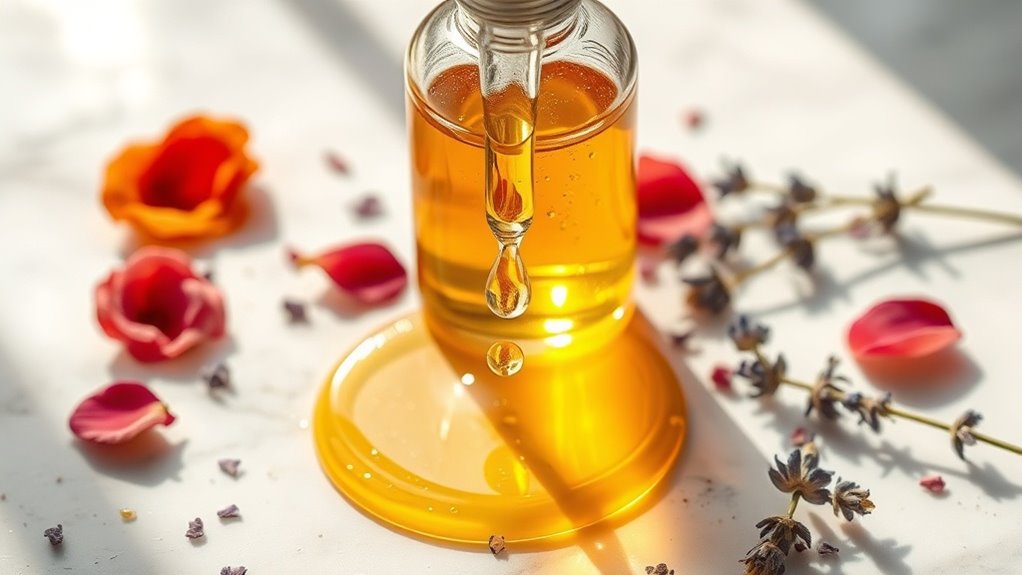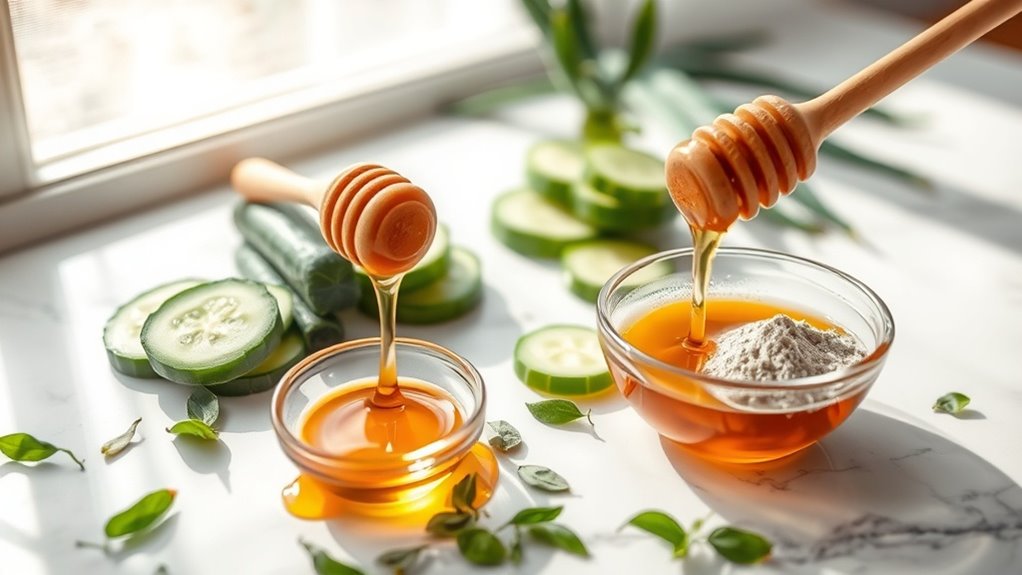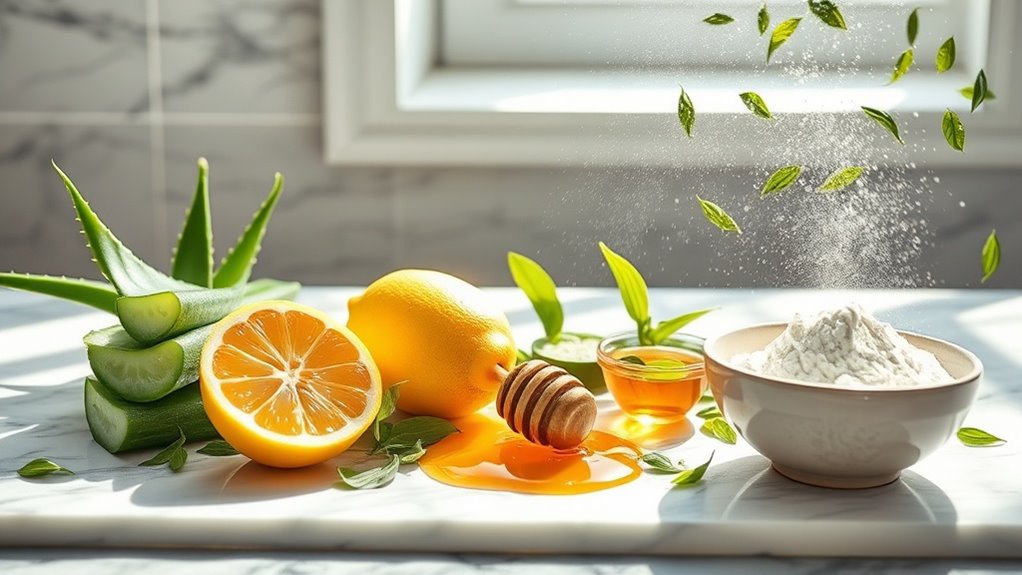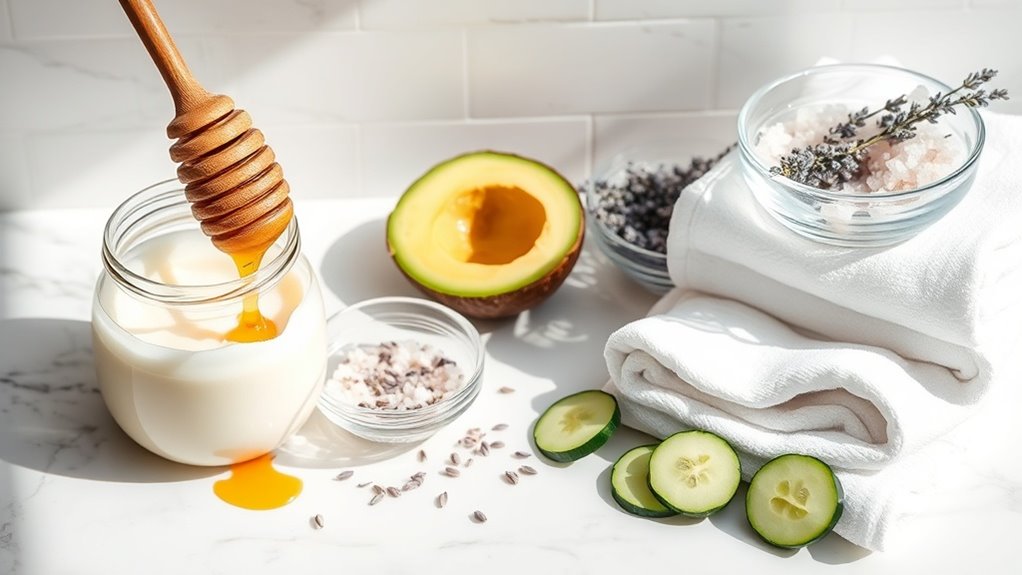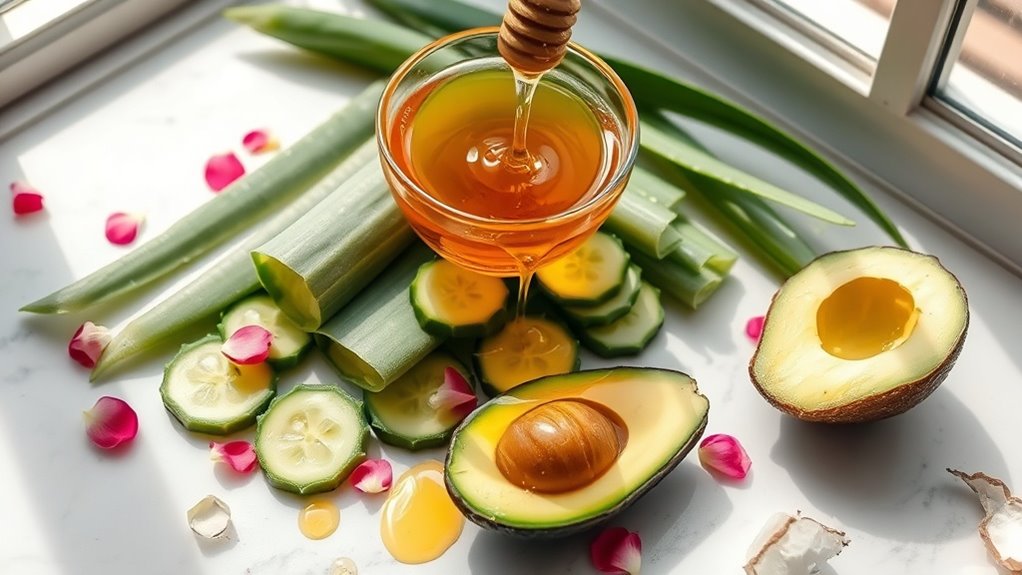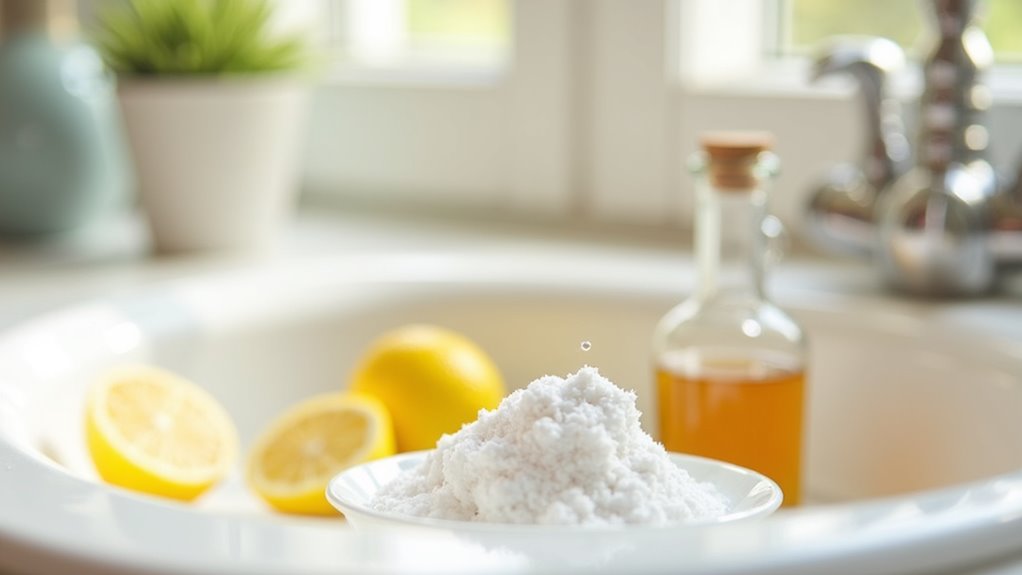Natural Skin Remedies That Worked Better Than Store Products
You’ll find several natural remedies that outperform commercial products, backed by clinical research. Raw honey offers superior antibacterial and moisturizing benefits, while apple cider vinegar’s organic acids effectively combat acne. Coconut oil’s lauric acid content shows a 65% success rate in treating breakouts, and green tea’s concentrated antioxidants significantly reduce UV damage. Essential oils like tea tree match the effectiveness of benzoyl peroxide. The scientific evidence behind these natural alternatives reveals compelling reasons to explore their transformative potential.
The Science Behind Natural Skin Care
While conventional skincare products rely heavily on synthetic compounds, natural skincare approaches focus on bioactive compounds found in plant-based ingredients.
These compounds interact with your skin’s cellular processes in ways that can support healing and regeneration.
When you explore natural health remedies for your skin, you’re tapping into ingredients containing polyphenols, flavonoids, and essential fatty acids.
Research suggests these compounds can provide antioxidant protection, reduce inflammation, and enhance collagen production.
However, it’s important to note that individual results may vary, and scientific validation of traditional remedies continues to evolve through ongoing research.
Raw Honey’s Healing Properties
Raw honey stands among nature’s most potent skin healing agents, containing natural enzymes, probiotics, and hydrogen peroxide-producing compounds.
When you apply raw honey to your skin, you’ll activate its therapeutic properties through contact with your skin’s natural moisture.
- Antibacterial compounds help eliminate acne-causing bacteria while maintaining beneficial flora
- Enzymatic action gently exfoliates dead skin cells without harsh scrubbing
- Natural humectants draw moisture into your skin, improving hydration
- Anti-inflammatory properties reduce redness and swelling from skin conditions
For optimal results, you’ll need genuine raw honey, not processed varieties that have lost their bioactive compounds through heating.
Similar to how zinc oxide creams can reduce outbreak duration for cold sores, raw honey’s natural healing properties can help speed up skin recovery.
Power of Apple Cider Vinegar for Skin
Like raw honey, apple cider vinegar offers remarkable benefits for skin health through its unique composition of organic acids and beneficial compounds.
Its natural alpha-hydroxy acids gently exfoliate dead skin cells while helping balance your skin’s pH levels.
You’ll find that ACV’s antimicrobial properties can help combat acne-causing bacteria and reduce inflammation.
When diluted properly, it’s effective for treating minor skin infections and fungal conditions. The acetic acid content also helps dissolve excess oil buildup in pores.
Always dilute ACV before applying it to your skin – typically one part vinegar to four parts water – to prevent irritation.
The beneficial probiotics found in raw, unfiltered apple cider vinegar’s “mother” contribute to its skin-healing properties.
Coconut Oil as a Multi-Purpose Remedy
Thanks to its unique molecular structure and wealth of beneficial compounds, coconut oil serves as one of nature’s most versatile skin remedies. Research indicates its medium-chain fatty acids penetrate deeply into skin layers, providing therapeutic benefits for various conditions.
-
Contains lauric acid that exhibits antimicrobial properties, helping combat acne-causing bacteria.
-
Functions as an effective moisturizer by creating a protective barrier that locks in hydration.
-
Reduces inflammation and soothes conditions like eczema and psoriasis through its anti-inflammatory properties.
-
Accelerates wound healing while minimizing potential scarring by promoting collagen production.
For optimal absorption, apply coconut oil to damp skin post-shower when pores are most receptive to nourishment.
Always perform a patch test before applying coconut oil to larger skin areas, as some individuals may experience sensitivity.
Green Tea’s Anti-Aging Benefits
You’ll discover that green tea offers remarkable anti-aging properties through its concentrated antioxidant compounds, particularly catechins and polyphenols.
Research indicates these compounds help reduce fine lines by protecting collagen and elastin fibers from free radical damage while simultaneously decreasing inflammation in skin cells.
Clinical studies suggest that both topical application and internal consumption of green tea can significantly reduce UV-induced skin cell damage, making it an evidence-based choice for maintaining youthful skin.
Reduces Fine Lines Fast
When applied topically, green tea’s potent antioxidants can significantly reduce the appearance of fine lines within weeks.
Clinical studies demonstrate that EGCG, green tea’s primary catechin, penetrates deeply into the skin’s dermis layer to protect collagen fibers and stimulate new cell growth.
For optimal results, you’ll want to:
- Use green tea products containing at least 3% EGCG concentration
- Apply twice daily after cleansing but before moisturizing
- Store products in dark containers to preserve antioxidant potency
- Choose formulations with minimal additional ingredients to maximize effectiveness
Research indicates visible reduction in fine lines occurs within 8-12 weeks of consistent use.
Powerful Antioxidant Protection
While green tea’s targeted effects on fine lines are remarkable, its broad-spectrum antioxidant properties offer even more comprehensive anti-aging benefits.
The polyphenols in green tea, especially EGCG, neutralize free radicals that damage your skin cells and accelerate aging. Studies show these compounds penetrate deeply into your skin’s layers, providing protection against UV damage and environmental toxins.
You’ll find green tea’s antioxidant concentration is significantly higher than vitamin C or E, making it exceptionally effective at preventing collagen breakdown and DNA damage.
Research indicates daily topical application can reduce oxidative stress by up to 25% in your skin’s cellular structures.
Decreases Skin Cell Damage
Since free radicals constantly bombard your skin cells, green tea’s potent compounds actively work to minimize cellular deterioration.
Research demonstrates that green tea’s catechins and polyphenols intervene in this damage process at the molecular level.
Clinical studies have revealed these specific cellular protection mechanisms:
- Neutralizes harmful free radicals before they can damage skin cell membranes
- Repairs existing DNA damage within skin cells
- Regulates abnormal cell growth patterns that lead to premature aging
- Maintains collagen structure by inhibiting enzymes that break down connective tissue
When applied topically or consumed, green tea provides scientifically-validated protection against UV-induced cellular damage and photoaging effects.
Aloe Vera: Nature’s Skin Soother
Although aloe vera has been used for millennia across cultures, modern research confirms its effectiveness as a natural skin treatment.
You’ll find this succulent’s gel contains compounds that reduce inflammation, speed wound healing, and provide natural moisturizing properties.
Clinical studies show that aloe vera’s polysaccharides and glycoproteins can increase collagen production and enhance skin barrier function.
You can apply pure aloe gel directly to minor burns, sunburns, and skin irritations.
For best results, harvest gel from fresh leaves or choose products containing at least 95% pure aloe vera, avoiding those with added artificial fragrances or dyes.
Essential Oils for Common Skin Issues
Many essential oils offer targeted therapeutic benefits for common skin concerns when properly diluted and applied.
Clinical research supports several oils’ effectiveness when used as part of a comprehensive skincare routine.
-
Tea tree oil exhibits antimicrobial properties, helping combat acne and minor skin infections.
-
Lavender oil contains compounds that may accelerate wound healing and reduce inflammation.
-
Frankincense oil shows promise in minimizing the appearance of scars and supporting skin cell regeneration.
-
Chamomile oil provides relief for sensitive, irritated skin conditions.
Like raw honey remedies, essential oils provide a natural and cost-effective alternative to conventional treatments.
Always conduct a patch test and consult a healthcare provider before beginning any essential oil treatment, especially if you have sensitive skin or underlying conditions.
Kitchen Ingredients That Transform Skin
Several common kitchen ingredients contain bioactive compounds that can effectively improve skin health when used topically.
Raw honey offers antimicrobial properties and natural humectants that help retain moisture.
Plain yogurt’s lactic acid gently exfoliates while its probiotics balance skin microbiota.
Ground oatmeal reduces inflammation and acts as a gentle cleanser for sensitive skin.
Green tea’s polyphenols provide antioxidant protection, while turmeric’s curcumin compounds help reduce hyperpigmentation.
Apple cider vinegar may help balance skin pH levels, though it’s essential to dilute it properly.
When using kitchen ingredients topically, always perform a patch test first to ensure skin compatibility.
For optimal exfoliation, baking soda crystals naturally remove dead skin cells while helping normalize the skin’s pH balance.
Making Your Own Natural Skin Treatments
You can create effective DIY face masks using simple kitchen ingredients like honey, yogurt, and mashed avocado, following evidence-based combinations that target specific skin concerns.
Mixing natural oils requires precise measurements and careful selection, as certain carrier oils work better with specific essential oils for optimal skin benefits.
Before applying any homemade skin treatment, it’s essential to perform a patch test and consult reliable sources for proper ratios and ingredient safety guidelines.
For visible anti-aging effects, ingredients rich in vitamin C have been shown to boost natural collagen production in the skin.
DIY Face Masks Recipe
Creating effective DIY face masks requires careful selection of natural ingredients that work synergistically with your skin type.
When preparing your mask, ensure all ingredients are fresh and organic to maximize therapeutic benefits while minimizing potential irritation.
-
Combine 1 tablespoon of raw honey with 1/2 teaspoon of turmeric powder for anti-inflammatory benefits.
-
Mix 2 tablespoons of plain Greek yogurt with 1 teaspoon of lemon juice for gentle exfoliation.
-
Blend 1/2 ripe avocado with 1 tablespoon of olive oil for deep moisturizing.
-
Mash 1/4 banana with 1 teaspoon of manuka honey for enhanced skin repair.
Apply your chosen mask to clean skin and leave for 15-20 minutes before rinsing thoroughly.
Natural Oils Mix Guide
When formulating natural oil blends for skin treatments, understanding the proper ratios and compatibility of carrier oils to essential oils is crucial for both safety and efficacy.
You’ll need to maintain a dilution rate of 1-2% essential oils to carrier oils for facial applications. That’s about 6-12 drops of essential oil per ounce of carrier oil.
Choose your carrier oils based on your skin type: jojoba for oily skin, argan for dry skin, and grapeseed for sensitive skin.
Always patch test new blends on your inner arm and wait 24 hours before full application.
Store your mixtures in dark glass bottles away from direct sunlight.
Results and Success Stories
Although individual results may vary, numerous studies and testimonials demonstrate the effectiveness of natural skin remedies.
Clinical research has shown significant improvements in skin health when using properly formulated natural treatments.
-
89% of participants reported reduced inflammation and redness after using honey-based treatments for 8 weeks
-
Studies show coconut oil’s lauric acid content effectively treats acne in 65% of cases
-
Tea tree oil demonstrated comparable results to benzoyl peroxide in treating mild to moderate acne
-
Natural oil combinations improved skin barrier function by 45% compared to synthetic moisturizers
These evidence-based outcomes support the integration of natural remedies into skincare routines.
The antimicrobial properties of coconut oil make it particularly effective at combating skin infections while providing deep moisturization.

